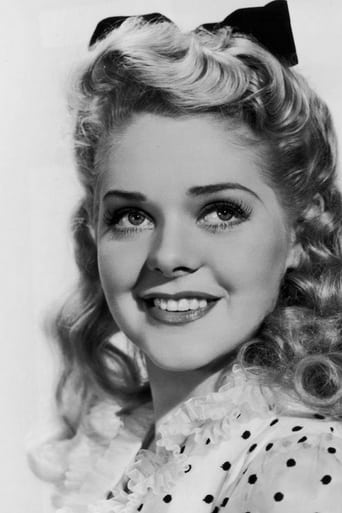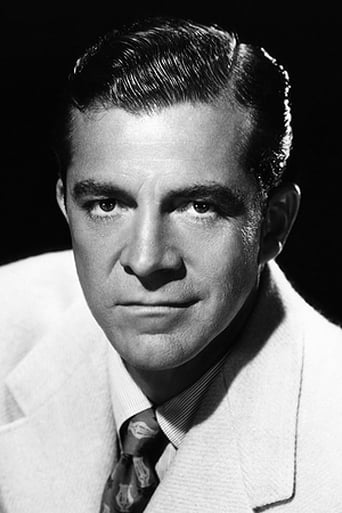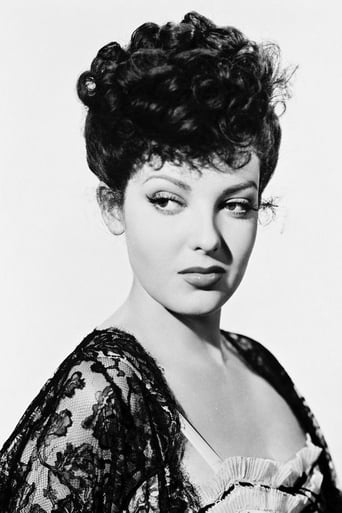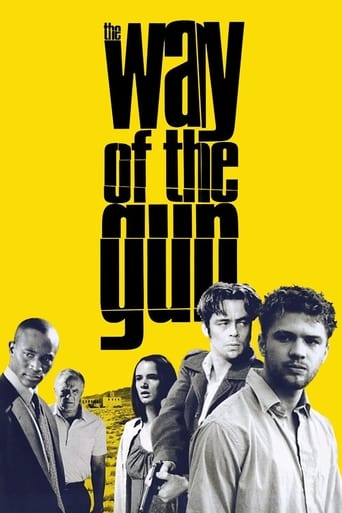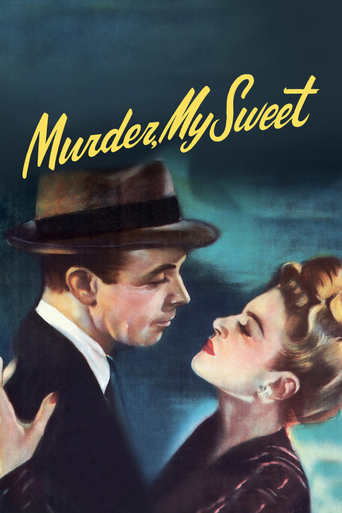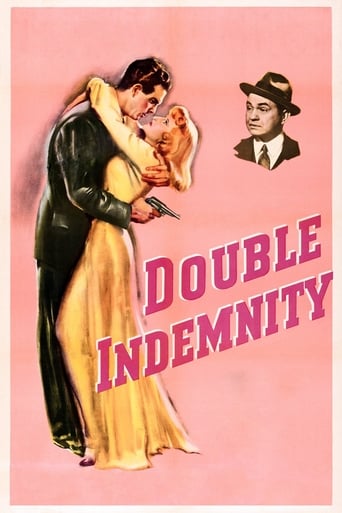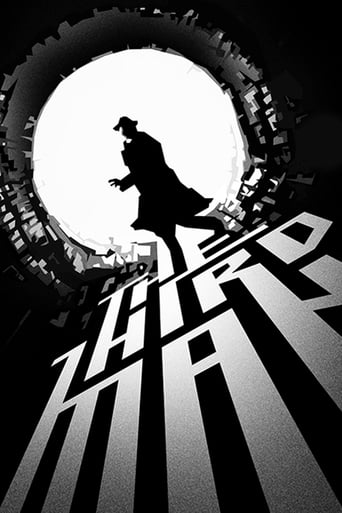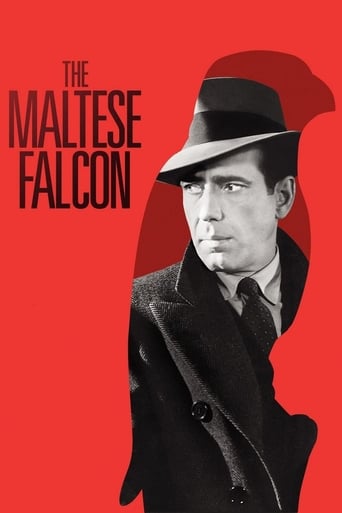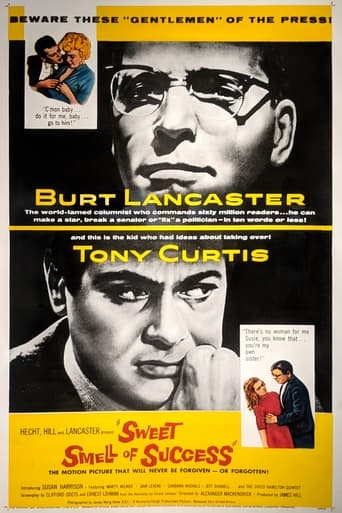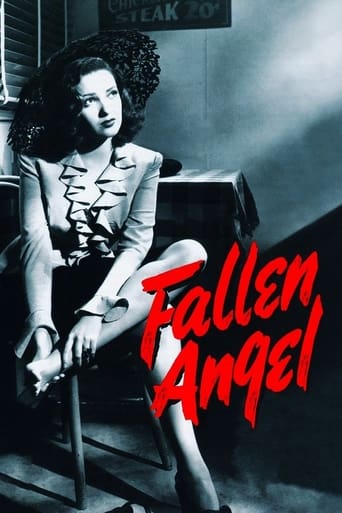
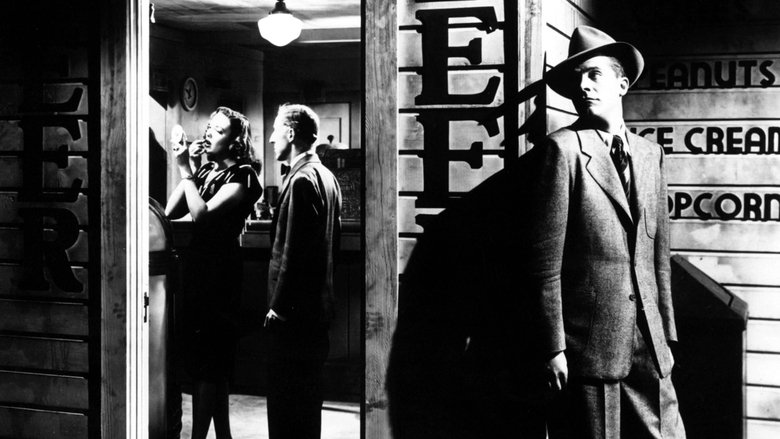
Fallen Angel (1945)
An unemployed drifter, Eric Stanton wanders into a small California town and begins hanging around the local diner. While Eric falls for the lovely waitress Stella, he also begins romancing a quiet and well-to-do woman named June Mills. Since Stella isn't interested in Eric unless he has money, the lovelorn guy comes up with a scheme to win her over, and it involves June. Before long, murder works its way into this passionate love triangle.
Watch Trailer
Cast
Similar titles
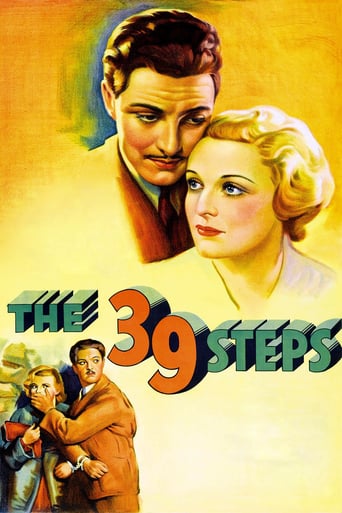
Reviews
Just perfect...
Fun premise, good actors, bad writing. This film seemed to have potential at the beginning but it quickly devolves into a trite action film. Ultimately it's very boring.
There is, somehow, an interesting story here, as well as some good acting. There are also some good scenes
Through painfully honest and emotional moments, the movie becomes irresistibly relatable
Young middle-age Eric Stanton is down on his luck: broke after squandering his substantial savings on gambling. He's found a young knockout waitress(Linda Darnell, as Stella) at a bus stopover, on the way to San Francisco, who he would like to marry. But, he has competition. She wants a home and other things right away. Since he is jobless, he will have to use his imagination to come up with the dough. His competition seems to be mostly several middle-aged men who are regulars at Pop's drugstore, where she works. They take her out on dates with their car. But Eric has no car and no money to take her out. Then, he finds out about a pair of spinster sisters: June(Alice Faye)and Clare( Anne Revere) Mills, who inherited their house and considerable money. He schemes to marry one, take most of her money, then divorce her, and marry Stella. Easier said than done, as he discovers. After establishing a relationship with 'Professor' Matley(John Carradine): a spiritualist, Eric contacts the pair and offers them tickets to a séance, which will feature their deceased father. They reluctantly agree, but are not impressed with the 'show'. However, Eric continues to engage their attention. Soon, it's plain that June, the better looking sister, is interested in him. Soon, they shock everyone, especially sister Clara, by announcing they got married that day. That evening, Eric goes to Stella, and tells her the story and that he will soon have the money for a house, and then will divorce June. But Stella doesn't buy it , and goes on her planned date with Dave Atkins(Bruce Cabot). The next morning, everyone is dumbfounded by the news that Stella was murdered last night. Her estimated time of death is an important detail in ruling out various suspects, including Eric. Nonetheless, the investigator Mark Judd(Charles Bickford) keeps Eric in mind as a prime suspect. Thus, the remainder of the film is mostly devoted to trying to prove who murdered Stella, and to strengthening the Eric/June relationship.......We can understand why Stella would want to date a variety of men, with her ultimate goal of marrying one who can immediately provide her with a home. In contrast, June seems not particularly interested in men. She already has a home and plenty of money she inherited. Thus, she's not dependent on a man to provide these things. Why then would she fall for Eric, who had the smell of a con man? My guess is she saw in Eric a handsome man, about her age, whom she thought had potential to be a good provider, if he was given some help to get back on his feet, and hopefully reign in his weaknesses(especially gambling). She didn't know he was a compulsive gambler until after they were married. Now, she has to fear he could gamble away her inheritance. Both Eric and Stella seem narcissistic, in contrast to June, who seems nurturing. I suspect she hopes she can convert Eric into being nurturing too, after he gets on his feet, financially. See the movie, available at YouTube, to find out who murdered Stella.
A seedy environment, reckless actions and the infatuation of a femme fatale. These elements of film noir are essential in Fallen Angel in portraying a secretly yet deeply morally corrupt society by following the journey of the protagonist.Drifter Eric Stanton finds himself in the town of Walton, a place whose exterior seems wholesome but a number of the residents are the opposite conversing in cafes, dance halls and quiet spots. Most notably local waitress Stella who oozes sexuality just by being in a room evident in her opening scene. As with most male protagonist in film noirs Eric immediacy becomes fixated on the emotionally lethal Stella to the point of becoming involved with a less tainted woman in order to steal money, all as a result of Eric's blind passion for Stella. Delving deeper into their relationship Eric and Stella have common ground; both are searching for their vision of a perfect lifestyle and won't let morals get in the way. It becomes somewhat appealing to see these fragile figures together mixing in their immorality. Yet the visions they both share soon leads them to dark ends.Fallen Angel's plot reaches its core with the murder of Stella evokes dangers for Eric. Whilst the situation turns nasty, Eric runs to safety with June, the less tainted woman he married solely for her money. However this relationship which had been built upon deception turns two dimensional. It offers a great dynamic to Fallen Angel as Eric finally finds the permanency he had been drifting years for in June, whose kind and loving personality leads Eric to a more pure existence. Kudos has to be given to Alice Faye, who makes her performance as June one of heartfelt sentiment that we cheer for her to sway Eric to moral goodness.And with good reason as the climax reveals a senior figure in Walton as the murderer not only gave a pessimistic view of amorality in society but also mirrored how Eric's life could have been if his infatuation with Stella had gotten to more extreme heights. This reflective realisation and the whole dynamic of Eric drifting between the worlds of evil and good make Fallen Angel a provocative character piece.
One of the most unappealing movie heroes ever to grace the big screen at the height of the studio era has to be Dana Andrews in Fallen Angel. Knowing what we learn about his character as the film Fallen Angel progresses, you have to wonder what both good girl Alice Faye and bad girl Linda Darnell see in him.Dana Andrews gets dropped off the bus in a small, sleepy California town because he's got no more money to proceed any farther. He's broke, but he's a hustler and manages to get involved with fake spiritualist John Carradine who gets 'messages' from the dead in whatever town he's holding a public séance. In this case his biggest message is from the late father of rich sisters Anne Revere and Alice Faye.In the meantime Andrews also gets himself involved with mantrap waitress Linda Darnell who's got the hormones in overdrive of a lot of people, salesman Bruce Cabot, retired cop Charles Bickford, her employer Percy Kilbride, just about every mail she comes in contact with. When she winds up murdered there are no shortage of suspects.Andrews has married Faye to get his hands on her fortune and Revere objects mightily to her new brother-in-law. It's all a tangle of intrigue.This was Dana's second film with Otto Preminger, they would do more. He was given his first break in Otto's Laura the year before and there are certain similarities. He's not a cool and unflappable cop, in fact even though we know he's not guilty, he feels guilty because he did marry Faye for her money. The hunter here is Charles Bickford who came out of retirement to help this sleepy suburb deal with an unexpected homicide.Faye has the Laura part, the innocent about which all the intrigue seems to be. This was her last film and a non-musical role, but it didn't start out that way. That song you hear Dick Haymes sing out of a jukebox, Slowly, was done by Faye, but it and many other of her scenes were cut by Darryl Zanuck who was trying to build up Darnell. Alice was so incensed that she walked out of her contract and didn't come back for almost 20 years. She passed on a flock of musicals that Zanuck had her in mind for that Betty Grable wound up doing.Fallen Angel was skirting some Code boundaries in this one and it's quite ahead of its time. I could see a remake of it done today with say Tom Cruise, Katie Holmes, and Drew Barrymore.
Otto Preminger and star Dana Andrews made this film a year after their highly acclaimed "Laura", with leading ladies Linda Darnell and Alice Faye (top billed above Darnell and Andrews). As with "Laura", this is a mystery film and fits solidly into the genre of mystery, and not suspense as many have claimed. This is just the first of many misunderstandings in my opinion about the film that stem from genre concerns.Although in a sense it's intriguing, the first thing that limits this film is the seemingly random and even arguably contrived nature of the main character's actions. Eric (Andrews) arrives in town short of bus fare to San Francisco, and manages to involve himself with a sham-mystic (John Carradine) and a pair of young ladies with a small inherited fortune (Faye and Anne Revere as her jealous sister), all as a sidelight to falling in love with sultry barmaid Stella (Darnell). He promises Stella that he can get enough money to marry her and buy her a house, seemingly by marrying June (Faye) and stealing her money from the safe deposit box in SF.Given this scenario, it's extremely hard for the film-makers to twist our sympathies so that they eventually favor all 3 of the principals. First of all, we're supposed to believe that June has some deep, truly meaningful emotional commitment to Eric even though they've only known each other for a week and Eric was busted trying to steal her money and could possibly be a killer. It's the old standard "women's picture" trope about the faithful wife, draw to a truly ridiculous extreme that would make most modern viewers cringe.Then we have Eric, a truly weird guy. Dana Andrews was not the best actor to play this character; he is too much of a static presence to play such a dynamic speaker and personality. It calls for the kind of grace and glib that Tyrone Power showed in "Nightmare Alley" or Glenn Ford in "3:10 to Yuma." It's a little bit hard to believe that Dana Andrews of all people has some kind of preternatural charm.But then there's Darnell, cast as a good girl who bears every distinguishing mark and trait of a very bad girl. She's very sexy in this movie and the dance-hall scenes and beach scenes are perhaps some of the steamiest of the 1940s. However I was surprised so many reviewers here singled her out as a bad girl or a "femme fatale." They must be viewing the film through the context of the so-called "film noir" genre as opposed to the mystery genre which this film is actually a part of. If you take time to really re-construct the story, she is a complete innocent (which, in turn, justifies Eric's "obsession" with her as simply a romantic emotion). It's clear she has a prior relationship of some kind with the sadistic detective Judd (Charles Bickford", who we find out at the conclusion was the killer, motivated by jealousy over Eric and another suitor (Bruce Cabot). Instead of a woman motivated to manipulate all 3 men for money, it becomes easy to see that she was so terrified by Judd's behavior that she made a desperate plea to both Eric and Cabot's character in the hopes that they could rescue her from the psycho-stalker police officer. How so many people can still see her as a "femme fatale" after all the facts are on the table is sort of beyond me, but I suppose it's part of the convoluted and unreal nature of this narrative to begin with.The film is far from a total success but just as far from a total bore. The scenes with Darnell and Andrews are delicious, and the weird asexual stalemate between Faye and Andrews is almost as interesting although somewhat too sincere. There's a wince-inducing scene where they lounge on the beach (Andrews: "Every night could be like this: on the beach, eating hot dogs....") and then the strange aftermath of Stella's death with June's disturbing reaction (she insists she knows he can't be the killer, although she's only known him for a week during which he tried to steal her life's savings). Preminger's excellent direction makes this rather predictable and improbable murder a very enjoyable viewing experience.
